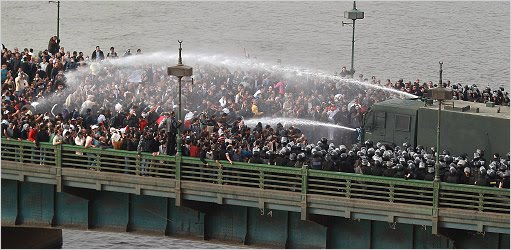By Abdel-Rahman Hussein
After almost three decades in power, 2010 was a year that displayed remarkable insight into President Hosni Mubarak, whether through leaked US Embassy cables or the memoirs of a former American president.
It was also a year in which his health was again a news item, but this time handled with slightly more openness and no arrests of newspaper editors as in 2008. Then, as rumors abounded about concerns over Mubarak’s health, Al-Dostor then-editor Ibrahim Eissa was sentenced to two months imprisonment for questioning the state of the president’s health.
In 2010 Eissa would not be subject to arrest, yet he would have to contend with being removed from his post as chief editor of Al-Dostor after it’s buyout by Wafdists Al-Sayed Al-Badawi and Reda Edward.
In March, Mubarak underwent gallbladder surgery in Germany, and removal of a growth on his small intestine. Possibly learning from previous errors, this time the regime declared beforehand that he was having the surgery and official coverage of a Mubarak in recovery was shown on terrestrial television.
Upon his return, he remained in convalescence in Sharm El-Sheikh but his health meant that his annual Labor Day speech (May 1) was delayed as he remained at the coastal resort. Instead, he was to meet with Israeli Prime Minister Binyamin Netanyahu and Palestinian Authority President Mahmoud Abbas to discuss the peace process.
However, those meetings were also delayed too, but it was denied by Cabinet Spokesman Magdi Radi that it had anything to do with Mubarak’s state, whom he insisted was “in good health.” The president later made numerous appearances all over the country in an effort to indicate that he had been unaffected by the surgery in Germany.
Another issue that also remained unaffected was Mubarak’s distrust and indeed dislike of Islamic movements such as the Muslim Brotherhood in Egypt as well as Hamas in the Gaza Strip and Hezbollah in Lebanon.
This is at least the portrayal of Mubarak that comes out in the US Embassy cable dispatches leaked online by whistle-blower website Wikileaks. But before Cablegate became news, other sources also shed light on the regime’s attitude towards Islamic movements.
First there was the Time magazine article published in November that suggested that Egypt had aided Israel in the assassination of a Gaza operative called Mohamed Namnam affiliated with a group called the Army of Islam.
The article alleged that Egypt had tipped off Israel about Namnam because he was planning operations against US forces stationed in Sinai. An unnamed source told the magazine that “Egypt is helping [Israel] much more” and the reason behind it was Mubarak’s anger over the discovery of cell affiliated with Hezbollah operating in Egypt.
A much bigger furor came later that month when former US President George Bush claimed in his memoir “Decision Points” that Mubarak said that Iraq had possessed weapons of mass destruction.
Bush wrote that Mubarak had warned General Tommy Franks that Iraq possessed “biological weapons and was certain to use them on our troops,” but “refused to make the allegation in public for fear of inciting the Arab street.”
Egypt “categorically denied” Bush’s claim; presidential spokesman Suleiman Awad stated that Mubarak had warned against the invasion because it was a violation of international law.
Yet it was leaked dispatches from the US Embassy in Cairo that highlighted Mubarak’s “hatred” for Islamic groups the most. One cable described Mubarak’s “hatred” of Hamas and his “visceral hatred” of its paymaster Iran, calling its leaders “big fat liars.”
Most leaked cables were cautiously welcomed by the regime. “It is still too early to comment. We wait, follow up and read but not everything we read is necessarily true. It could be distorted or planted for a reason,” Foreign Minister Ahmed Aboul Gheit said when asked to comment on the US diplomatic cables.
As far as Egypt is concerned, he said, the cables “confirm the strength of our position … The documents have shown that what we say in private behind closed doors reflects our public opinion.”
Another dispatch seemed to indicate Mubarak’s support of a dictatorship in Iraq. In advice he was giving to a US Congressional Delegation, he reportedly said, “Strengthen the armed forces, relax your hold, and then you will have a coup. Then we will have a dictator, but a fair one. Forget democracy, the Iraqis are by their nature too tough.”
Commentators remarked that this was possibly how Mubarak saw himself, as some sort of benign dictator, ruling with an iron fist but with fairness. This possible self-image doesn’t square with impartial reports on Egypt, whether in the areas of human rights, civil liberties or economic inequality and the wide disparity between rich and poor.
